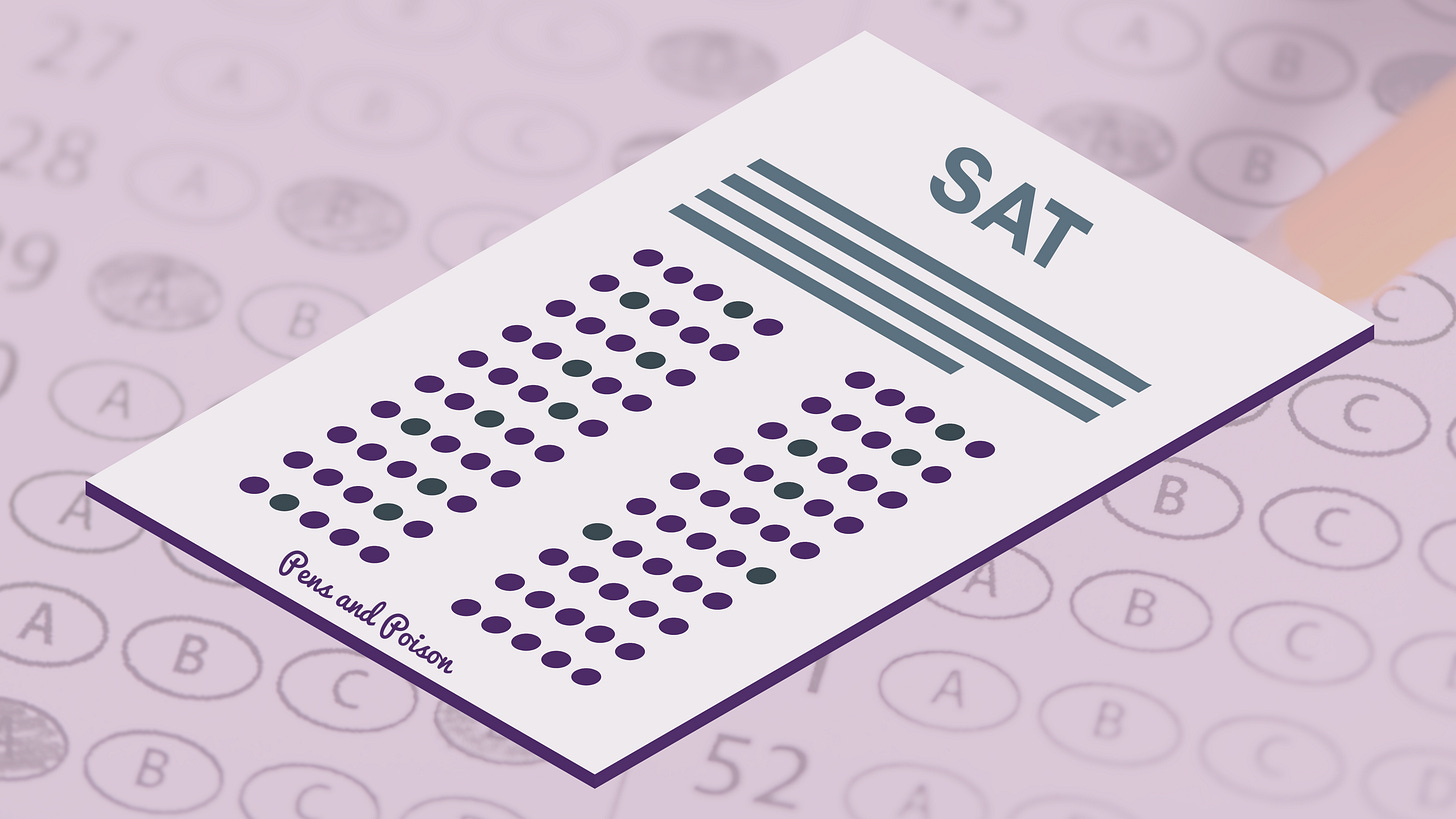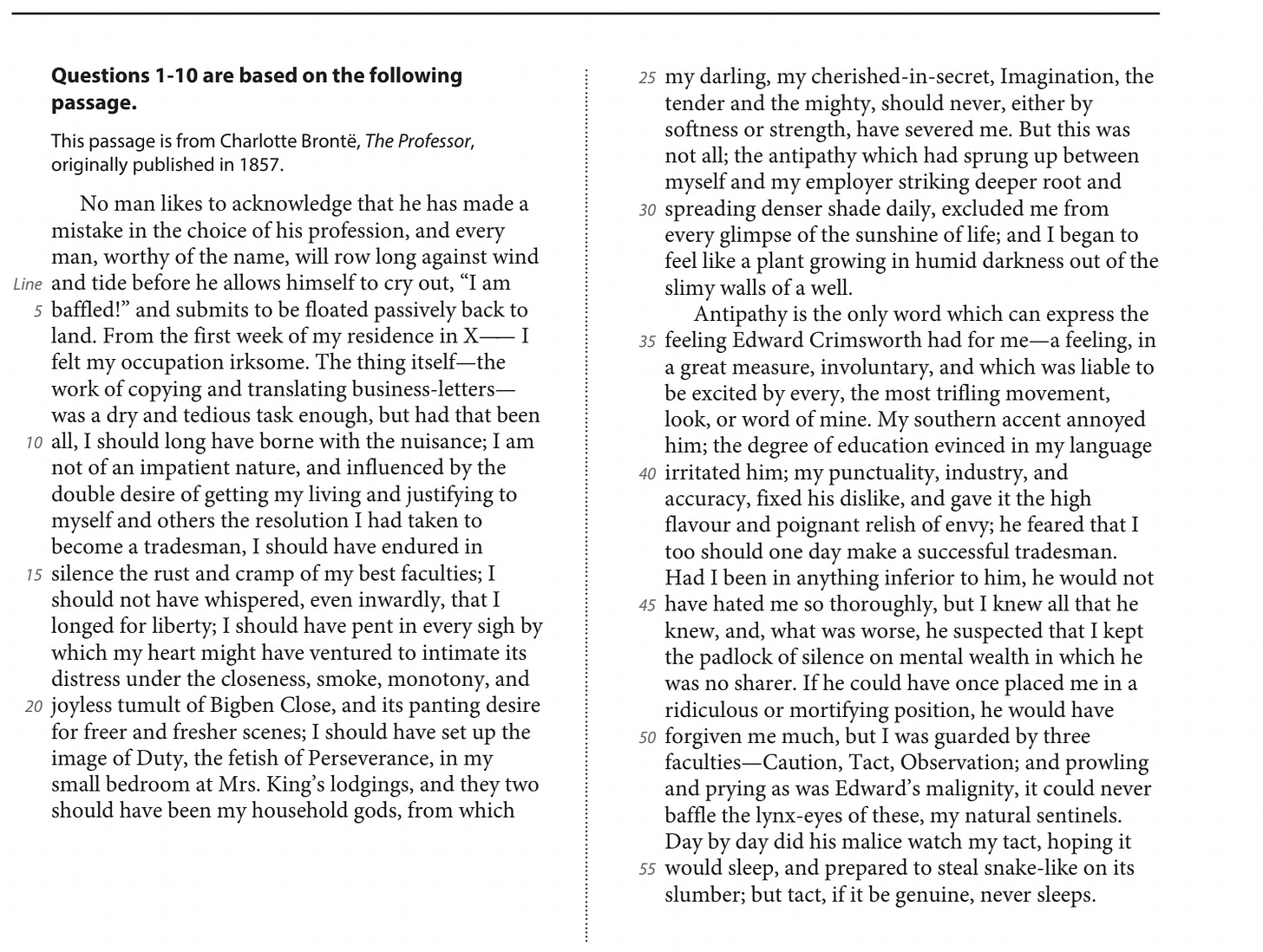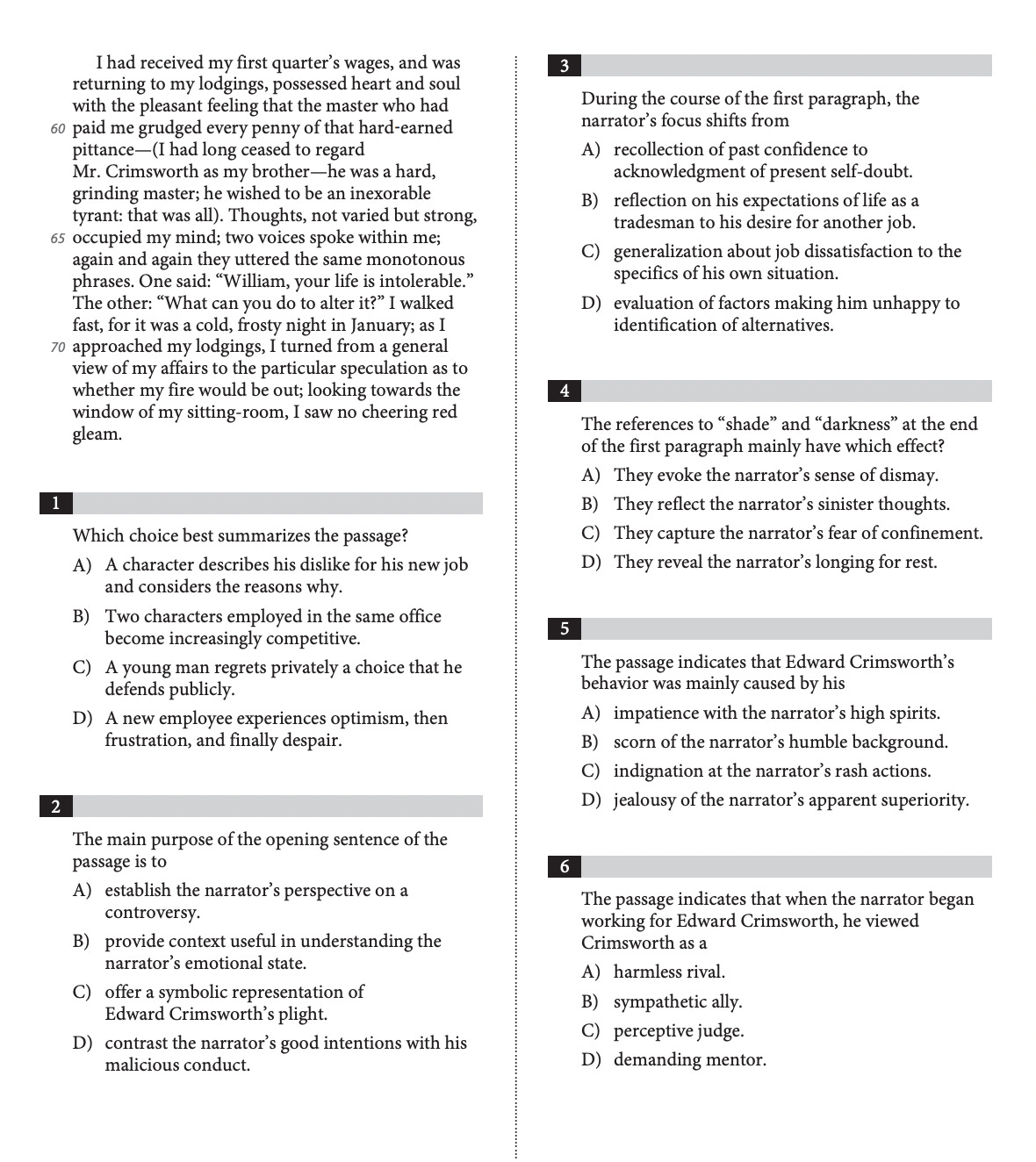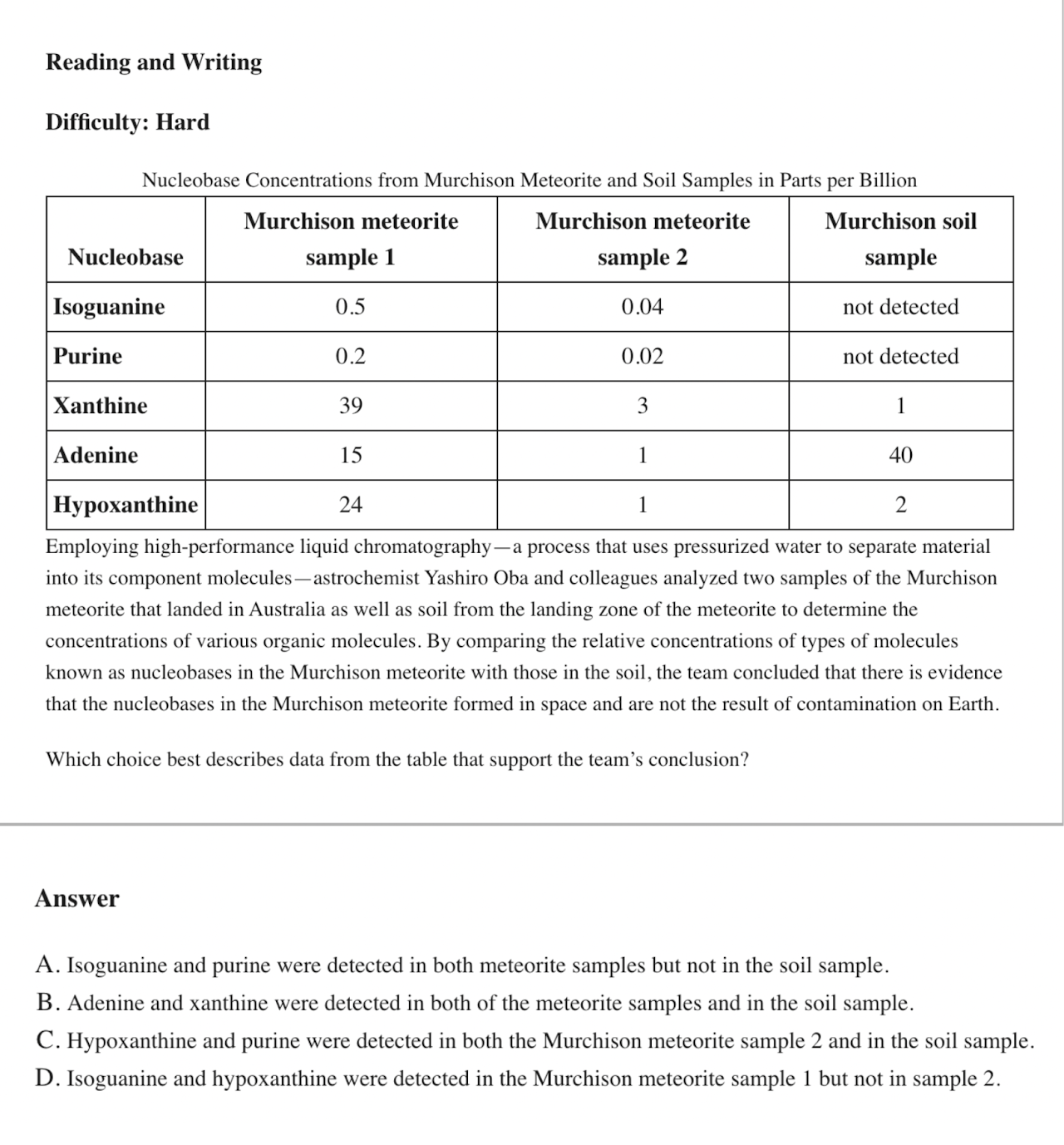The SAT Killed the Humanities
The SAT’s STEM Bias Points to a Larger Crisis in Reading and Writing
Our society has become obsessed with science, engineering, math, and technology (STEM)—not only in the name of progress but also because we have deemed reading and writing almost wholly unimportant. According to the American Academy of Arts and Sciences, the number of humanities bachelor's degrees awarded to graduating seniors across American universities decreased by approximately 24 percent over ten years, dropping from 236,826 humanities degrees awarded in 2012 to 179,272 in 2022. On the other hand, STEM degrees are on the rise, with 30 percent of all awarded bachelor’s degrees now in STEM fields. While these trends might make sense in our late-capitalistic society—after all, no one wants to be stuck paying college tuition only to end up with a barista job—the general anxiety surrounding the humanities major points to a broader cultural shift: we no longer treat advanced literacy as essential to education or citizenship.
“Anti-reading” trends have become evident in aspects of our society—from the general decline of student reading comprehension to the virtual abolition of reading assignments—yes, reading assignments—in English classrooms. Students opt for efficiency over mastery, and with ChatGPT virtually eliminating the need for higher-order reading and writing skills—at least from the perspective of high school students looking to pass their English classes—a dwindling number of my current high school students can write a sentence on their own. Nearly all of my seniors, furthermore, have expressed a desire to study artificial intelligence (AI) in some capacity, and few, if any, are able to name a single complete book they have read throughout their high school careers. The irony, of course, is that as AI automates coding, data analysis, and other once-coveted skills, even STEM degrees are beginning to lose their luster. Nevertheless, students continue to prioritize logarithms over Shakespeare, believing that knowing how to read and analyze complex texts will do little for their future careers.
While it might be easy to blame their teachers or the rise of LLM use for this catastrophe, I believe that the decline of advanced literacy cuts even deeper: we have become so hyper-fixated on science, progress and technology that we have dressed up many benchmarks for STEM readiness under the guise of “reading comprehension,” convincing ourselves that our students can, indeed, read when, in reality, they are completing tasks that absolutely have nothing to do with reading or writing.
Nowhere is this societal confusion more evident than through the 2023 redesign of the SAT.
Since its debut in 1926, the SAT has assessed college readiness in students across America. In the words of the College Board, the test is designed to “demonstrate knowledge and skills in areas that current research tells us are most critical for college readiness and success.” What this tells us is that every new update of the SAT reflects the trends of the times—the 2016 SAT redesign, for instance, moved away from logical reasoning questions on the math section in favor of standard textbook math concepts taught in Algebra, Geometry, and Precalculus classes, suggesting a rise in the demand for students prepared to tackle higher-level math courses in college. But while the most recent SAT has kept its math section virtually unchanged from the previous iteration, the update to the reading and writing sections is appalling.
Gone are the days when students were expected to read multi-paragraph passages from great literary works, such as in the below excerpt from Charlotte Brontë’s The Professor, taken directly from a 2016 SAT reading section.
The new SAT questions look something like this:
My memory might be deceiving me—it’s been over 10 years since I graduated from high school—but I don’t recall ever being taught to read bar graphs in my English classes. I learned about scales and axes in both my science and my math classes, but I am not positive that data from lizard species ever surfaced in class discussions of Macbeth—though there might have been something about lizard legs in Act 4. What these SAT questions test is not reading comprehension at all but interpretation of data—skills essential to careers in medicine, research, finance, or tech, but almost entirely irrelevant to humanities fields. And while I agree that a well-rounded education is essential for students looking to go into any field—knowledge of bar graphs helps me track my book sales, for one–the question above belongs more on a math and science section of the SAT—certainly not on a section purporting to test reading comprehension!
Let’s take another example:
This particular question tests the interpretation of data pertaining to nucleobase concentrations in meteorite and soil samples. Again—I don’t know about you—but I certainly don’t remember learning about nucleobases in English or history classes. These sorts of questions seem to belong to a science section—such as the one on the SAT’s competitor test, the ACT. And as someone who scored perfectly on the reading and writing sections on the ACT but who genuinely struggled with the science section, I can tell you that interpreting data about nucleotides has nothing to do with aptitude for words.
And while there are still a few genuine reading comprehension questions on the new SAT, they never run longer than a paragraph and don’t require substantial attention to detail. The following question about Shakespeare—which runs just three sentences long and which I believe any student can answer in their sleep—tests nothing about knowledge of Shakespeare in the way the previous question requires a basic understanding of science experiments. In fact, the question, which is marked with the “Hard” difficulty, seems to ridicule the very notion that advanced reading comprehension is necessary at all. Compare this question with the passage from Charlotte Brontë, and you’ll see what I mean.
What happens as a result is that students interested in STEM gain a large advantage because of the questions on the SAT are now STEM questions, and students interested in the humanities have to learn STEM concepts in two different capacities. Simply put, anyone can pass the reading comprehension test, and students who are strong in humanities not only don’t get to demonstrate their skills but are also told that the very skills they excel at no longer matter. STEM students, on the other hand, are persuaded that they can tackle reading comprehension when, in reality, we have collectively decided that reading comprehension is no longer important.
But reading comprehension is essential for higher-order thinking. It is the very vehicle through which we express our ideas, solve problems creatively, and risk being fully human. Lizards and nucleotides are great, but they cannot exist in isolation—they cannot exist without a great thinker to make sense of them and to tell us why they matter. In abandoning literacy, we risk producing a generation of technicians who can analyze everything but understand nothing—putting a wrench in the very idea of “progress.”
But while the SAT might be on the decline, strong thinkers are not doomed just yet—by encouraging students to read and write deeply, we can foster the next generation of bright minds—and maybe see a reading-forward shift in the next iteration of the SAT.
Enjoyed this post? You can Buy Me a Coffee so that I’ll be awake for the next one. If you are a starving artist, you can also just follow me on Instagram or “X.”
Looking for a 1:1 consultation with Liza? Book me out here.









For some reason your article reminded me of the USDA food pyramid (and related guidance), and how it has changed over the years, not often for the good.
The first SAT change I heard about was, I think, in the seventies. With the net result being that test scores, on average, went up about 50 points. On one hand, I see the need to make changes in the tests annually, for various reasons, but I would like to see someone address the meta changes in the test that have taken place over the years. And I wonder how many of the meta changes were driven by the fact that the average IQ of the incoming freshman class, is now significantly lower than that of the class of, say, 1972.
Oh the humanity!